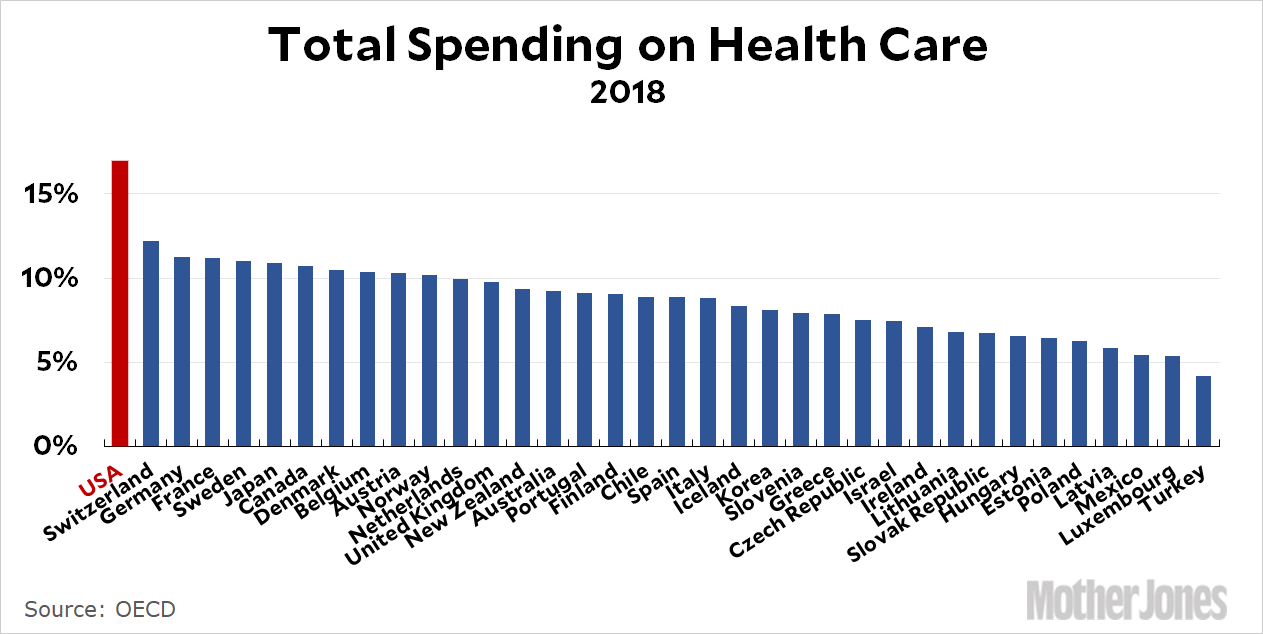From the Washington Post today:
America’s sky-high health-care costs are so far above what people pay in other countries that they are the equivalent of a hefty tax, Princeton University economists Anne Case and Angus Deaton say. They are surprised Americans aren’t revolting against these taxes.
….The U.S. health-care system is the most expensive in the world, costing about $1 trillion more per year than the next-most-expensive system — Switzerland’s. That means U.S. households pay an extra $8,000 per year, compared with what Swiss families pay. Case and Deaton call this extra cost a “poll tax,” meaning it is levied on every individual regardless of their ability to pay. (“Polle” was an archaic German word for “head,” so the idea behind a poll tax is that it falls on every head.)
Despite paying $8,000 more a year than anyone else, American families do not have better health outcomes, the economists argue. Life expectancy in the United States is lower than in Europe.
Quite correct. Here are latest 2018 health care spending numbers for all the developed countries of the world. The United States spends 16.9 percent of GDP on health care compared to 12.2 percent for Switzerland:

Let’s see. US GDP was $20 trillion in 2018. If we cut back to Switzerland’s level we’d reduce health care spending by 4.7 percentage points, or about a trillion dollars. There are roughly 128 million households in the US, so that comes to a savings of $7,800 per household. Case and Deaton have done their sums properly!
And that’s just Switzerland. If we spent at the OECD average level, we’d save more than $12,000 per family. How did our health care spending get so high?
That’s a complicated question, and it’s water under the bridge anyway. The real question at hand is: why don’t we make an effort to cut back to European levels? After all, they have perfectly fine health care even with much lower spending.
The answer to that is easier: It’s because most of our outsize expense comes from paying doctors more, nurses more, medical staff more, hospitals (and their workers) more, drug companies (and their workers) more, device makers (and their workers) more, and so forth. Thus, the only way to seriously cut back our health care spending is to pay people a lot less than they’re getting now, and this can be done only slowly if at all. You can’t suddenly tell doctors and nurses that they’re all getting 30 percent pay cuts. Hell, you can’t even do that to pharmaceutical companies, as much as we might like to. Aside from being massively disruptive, it would generate massive opposition. And in a democracy, massive opposition matter.
This is why I think Elizabeth Warren was right to say that if we’re going to adopt Medicare for All, we’ll need to phase it in. I just wish she were more forthright about it. The plain reality is that it will never happen unless we agree not to slash everyone’s pay and instead just put the brakes on future pay increases. Even that will hardly be popular, but it’s probably doable. It would mean that it’s a long time before we get anywhere near to European levels of spending, but that’s just the way it is.
Besides, it doesn’t really matter anyway. If we’re talking about a “long time,” our current spending patterns are meaningless. Within 20 years medicine will be revolutionized by robotics, artificial intelligence, CRISPR, and—who knows?—maybe even nanobots. When that happens, the cost of health care is going to plummet without Congress having to do anything at all. Hooray?














